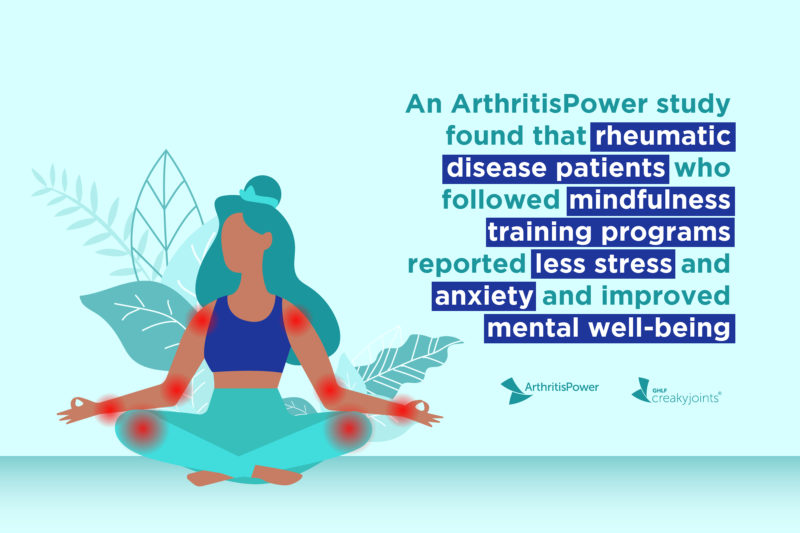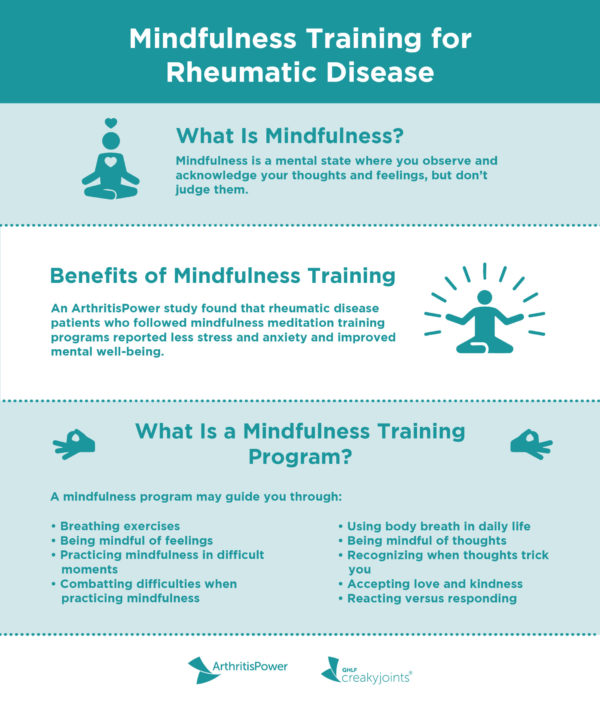When you have a rheumatic disease, you are not dealing with just physical symptoms. You’re also dealing with mental and emotional side effects that come from knowing you have an illness that often requires a lifetime of treatment, has no cure, and may be progressive. In fact, in a 2017 study published in British Journal of General Practice, researchers noticed anxiety 20 percent more often in people with rheumatoid arthritis (RA) than those without.
Helping patients cope with the mental and emotional aspects of chronic disease is an increasingly important part of well-rounded care for people with rheumatic conditions.
One tool that has been shown to be helpful in managing mental and emotional distress among rheumatic disease patients is mindfulness. According to Psychology Today, mindfulness is a mental state where you observe and acknowledge your thoughts and feelings, but don’t judge them. Several studies have found that rheumatic disease patients who go through mindfulness training have improved mental well-being compared to those who don’t.
But how much training is needed to reap its benefits? Mindfulness programs can range in length, as can the exercises within the program itself; you may be asked to do a 10-minute breathing exercise or an hour-long internal reflection. In a world where free time is hard to come by, people may only try practicing mindfulness if they find a program that feels doable for their needs. But they also want to know how much of a time investment is needed in order to get some benefit from mindfulness training.
A new study from the Global Healthy Living Foundation (GHLF) and CreakyJoints sought to evaluate and compare the effectiveness of two different-length mindfulness therapy programs for improving mental well-being among people with rheumatic diseases. Initial findings from the study were presented during the European E-Congress of Rheumatology 2021.
Patients with various rheumatic diseases from our ArthitisPower research registry were placed at random into one of two interactive mindfulness therapy programs:
- The “full-length” program lasted eight weeks with one 30- to 45-minute session per week
- The “brief” program lasted three weeks with one 30- to 45-minute session per week
Both programs guided patients through the following:
- Breathing exercises
- Being mindful of feelings
- Practicing mindfulness in difficult moments
- Combatting difficulties when practicing mindfulness
The eight-week program provided additional guidance on:
- Using body breath in daily life
- Being mindful of thoughts
- Recognizing when thoughts trick you
- Accepting love and kindness
- Reacting versus responding
Every two weeks during the program (and every four weeks during the three months that followed), patients were asked to complete four different wellness assessments in the ArthritisPower app: the World Health Organization Five Well-Being Index (WHO-5), Perceived Stress Scale (PSS), PROMIS Anxiety, and PROMIS Depression.
The most common rheumatic diseases among patients were osteoarthritis (61 percent), rheumatoid arthritis (56 percent), fibromyalgia (38 percent), and osteoporosis (21 percent). The patients included in the survey were mostly female (90 percent) and white (85 percent), so the results may not be generalizable to all patients with rheumatic diseases. The average age of participants was 58 years old.
Here is what we learned.
Regardless of length, mindfulness therapy programs can help reduce the anxiety and stress levels of people with rheumatic diseases
Researchers compared the bi-weekly and monthly assessments of each group to see whether the programs were effective, and if the length of the program impacted its effectiveness.
They found that patients in both programs reported a significant reduction in anxiety and stress levels throughout the course, and in the weeks that followed. Patients in both programs also reported a slight increase in mental well-being.
Eight weeks into the study, researchers found similar reductions in anxiety and stress levels among patients in the three-week program and patients in the eight-week program. This suggests that what is taught in a mindfulness program, not necessarily the length of it, is what may help improve mental health outcomes.
“This study suggests that people don’t have to invest a lot of time in learning how to practice mindfulness in order to reap the benefits of it,” says study co-author W. Benjamin Nowell, PhD, Director of Patient-Centered Research at the Global Healthy Living Foundation.
Mindfulness programs may be difficult for people to stick to, especially if they think it’s a big time commitment
The study began with 324 patients — 161 in the three-week course and 163 in the eight-week course. But only 70 patients completed their course — 35 in each group.
There was no follow-up with patients who did not complete the program and, therefore, researchers don’t know for sure what explains the high dropout rate.
The assumed time commitment, especially for people who don’t have a lot of free time, may turn people off from mindfulness programs, and we didn’t use a “personal touch” to keep people engaged in the program, instead relying on automated email reminders. But Dr. Nowell says these programs were designed to allow people to complete the courses in small chunks and when their schedule allowed.
“For future studies in this area, we need to anticipate that participants may not always stick with the program. So we need to support participants by delivering an engaging mindfulness program experience to make it more likely to finish, especially if we know they will see personal benefit from even a minimum of participation,” says Dr. Nowell.
Health care providers should not only talk to patients about the benefits of mindfulness, but suggest mindfulness programs
Taking care of your mental health is an important component of living with a rheumatic disease. This study suggests practicing mindfulness meditation can help in coping with the emotional distress — the stress and anxiety — that can accompany chronic illnesses.
But knowing mindfulness is a helpful tool and using mindfulness as a helpful tool are two different things. Dr. Nowell believes one way to get more people to practice mindfulness is to have providers recommend it as part of an overall treatment plan.
Doctors have to do more than mention the benefits of mindfulness to a patient, notes Dr. Nowell. They also have to guide the patient in the right direction.
“What we’ve heard from patients is that it’s not enough for a doctor to say, ‘you should try a new diet or new practice, like mindfulness,’” Dr. Nowell says. “They want their doctor to connect them to a program and say it’s a good one. That can make the difference in a patient acting on the advice rather than just hearing it.”
Although mindfulness can help improve mental well-being, it is not a sole solution to serious mental health issues. If you are struggling with mental health issues, talk to your doctor or health care provider to find effective solutions. They may suggest talking to a therapist or taking medications to manage your anxiety, depression, and stress.
Get Mental Health Support
We understand the mental health struggles that can occur when you are living with chronic illness. It is important to talk to someone who can help. You should contact your primary care physician or your insurance provider to learn about the supportive resources that are available to you. Here are other mental health resources for your reference:
- To find local support groups and services, you can call 1-800-950-NAMI (6264) or email info@nami.org. The National Alliance on Mental Illness HelpLine can be reached Monday through Friday, 10 AM to 6 PM ET.
- For a counselor or therapist in your area, view the resources page at Mental Health America: Finding Therapy.
- Crisis Text Line (free 24/7 support via text): Text HOME to 741741
- The Friendship Line from the Institute on Aging (toll-free 24/7 support for people ages 60 or over and adults living with disabilities): 1-800-971-0016
- LGBT National Hotline (free, confidential support for the lesbian, gay, bisexual, transgender, queer, and questioning community): 1-888-843-4564
- If your mental health concern is an emergency for you or someone else, you should call 911.
- If you are having suicidal thoughts or have or are thinking of hurting yourself, you should call the National Suicide Prevention Lifeline’s 24-hour toll-free crisis hotline, 1-800-273-TALK (8255).
Be Part of Research with ArthritisPower
Join CreakyJoints’ patient-centered research registry and participate in voluntary studies about managing arthritis. Learn more and sign up here.
Interview with W. Benjamin Nowell, PhD, director of Patient-Centered Research at GHLF
Machin A, et al. Improving recognition of anxiety and depression in rheumatoid arthritis: a qualitative study in a community clinic. British Journal of General Practice. August 2017. doi: https://doi.org/10.3399/bjgp17X691877
Mindfulness. Psychology Today. https://www.psychologytoday.com/us/basics/mindfulness
Nowell WB, et al. A mindfulness program dosing study to evaluate improvement in emotional distress among people with rheumatic disease. Annals of the Rheumatic Diseases. Volume 80, Supplement 1. 2021.







